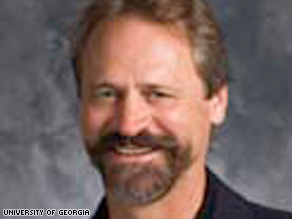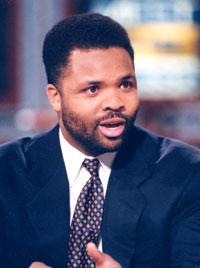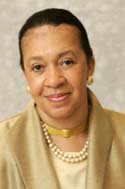
From My Way
Apr 29, 5:55 PM (ET)By CALVIN WOODWARD
WASHINGTON (AP) - "That wasn't me," President Barack Obama said on his 100th day in office, disclaiming responsibility for the huge budget deficit waiting for him on Day One.
It actually was him - and the other Democrats controlling Congress the previous two years - who shaped a budget so out of balance.
And as a presidential candidate and president-elect, he backed the twilight Bush-era stimulus plan that made the deficit deeper, all before he took over and promoted spending plans that have made it much deeper still.
Obama met citizens at an Arnold, Mo., high school Wednesday in advance of his prime-time news conference. Both forums were a platform to review his progress at the 100-day mark and look ahead.
At various times, he brought an air of certainty to ambitions that are far from cast in stone.
His assertion that his proposed budget "will cut the deficit in half by the end of my first term" is an eyeball-roller among many economists, given the uncharted terrain of trillion-dollar deficits and economic calamity that the government is negotiating.
He promised vast savings from increased spending on preventive health care in the face of doubts that such an effort, however laudable it might be for public welfare, can pay for itself, let alone yield huge savings.
A look at some of his claims Wednesday:
OBAMA: "Number one, we inherited a $1.3 trillion deficit.... That wasn't me. Number two, there is almost uniform consensus among economists that in the middle of the biggest crisis, financial crisis, since the Great Depression, we had to take extraordinary steps. So you've got a lot of Republican economists who agree that we had to do a stimulus package and we had to do something about the banks. Those are one-time charges, and they're big, and they'll make our deficits go up over the next two years." - in Missouri.
THE FACTS:
Congress controls the purse strings, not the president, and it was under Democratic control for Obama's last two years as Illinois senator. Obama supported the emergency bailout package in President George W. Bush's final months - a package Democratic leaders wanted to make bigger.
To be sure, Obama opposed the Iraq war, a drain on federal coffers for six years before he became president. But with one major exception, he voted in support of Iraq war spending.
The economy has worsened under Obama, though from forces surely in play before he became president, and he can credibly claim to have inherited a grim situation.
Still, his response to the crisis goes well beyond "one-time charges."
He's persuaded Congress to expand children's health insurance, education spending, health information technology and more. He's moving ahead on a variety of big-ticket items on health care, the environment, energy and transportation that, if achieved, will be more enduring than bank bailouts and aid for homeowners.
The nonpartisan Committee for a Responsible Federal Budget estimated his policy proposals would add a net $428 billion to the deficit over four years, even accounting for his spending reduction goals. Now, the deficit is nearly quadrupling to $1.75 trillion.
---
OBAMA: "I think one basic principle that we know is that the more we do on the (disease) prevention side, the more we can obtain serious savings down the road. ... If we're making those investments, we will save huge amounts of money in the long term." - in Missouri.
THE FACTS: It sounds believable that preventing illness should be cheaper than treating it, and indeed that's the case with steps like preventing smoking and improving diets and exercise. But during the 2008 campaign, when Obama and other presidential candidates were touting a focus on preventive care, the New England Journal of Medicine cautioned that "sweeping statements about the cost-saving potential of prevention, however, are overreaching." It said that "although some preventive measures do save money, the vast majority reviewed in the health economics literature do not."
And a study released in December by the Congressional Budget Office found that increasing preventive care "could improve people's health but would probably generate either modest reductions in the overall costs of health care or increases in such spending within a 10-year budgetary time frame."
---
OBAMA: "You could cut (Social Security) benefits. You could raise the tax on everybody so everybody's payroll tax goes up a little bit. Or you can do what I think is probably the best solution, which is you can raise the cap on the payroll tax." - in Missouri.
THE FACTS: Obama's proposal would reduce the Social Security trust fund's deficit by less than half, according to the nonpartisan Tax Policy Center.
That means he would still have to cut benefits, raise the payroll tax rate, raise the retirement age or some combination to deal with the program's long-term imbalance.
Workers currently pay 6.2 percent and their employers pay an equal rate - for a total of 12.4 percent - on annual wages of up to $106,800, after which no more payroll tax is collected.
Obama wants workers making more than $250,000 to pay payroll tax on their income over that amount. That would still protect workers making under $250,000 from an additional burden. But it would raise much less money than removing the cap completely.













 by
by  He is not willing to take the political heat in this case because there is language criticizing Israel and the West in the final document. As the world celebrates the election of the first Black President, the United States boycotts the world conference against racism. Symbolism, it seems has met political reality.
He is not willing to take the political heat in this case because there is language criticizing Israel and the West in the final document. As the world celebrates the election of the first Black President, the United States boycotts the world conference against racism. Symbolism, it seems has met political reality. 













